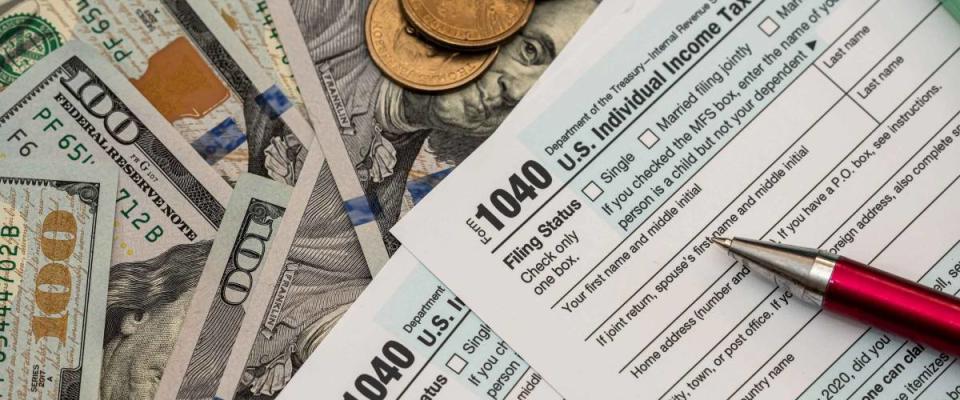Want the monthly child tax credit payments for families? Be sure to do this

If you've got kids and are hoping to receive the new, monthly payments from the latest pandemic assistance bill — sort of a series of stimulus checks for families — there's an important step you'll need to take.
The IRS is urging parents to file their tax returns as soon as possible, so households will receive the support they're entitled to. The checks, which will start going out in July, are part of a temporary expansion of the child tax credit.
A fourth round of the usual stimulus checks may not happen, so the child credit cash may be the last bit of direct government aid you’ll be receiving for a while. You don't want to miss out.
How much money will you get?

When Congress passed its most recent COVID-19 relief bill in March, lawmakers included a juiced-up version of the child tax credit as a way of providing more financial assistance to both parents and the country’s recovering economy.
Families who claim the credit for 2021 will receive as much as $3,000 per child ages 6 to 17, and $3,600 each for little ones under 6. That's up from the usual maximum of $2,000 per kid under age 17.
If you’re a single parent, you’ll have to earn less than $75,000 to receive the full per-child amount. For married couples filing a joint return, the income cutoff for maximum benefits is $150,000.
If your earnings are over the limit, your expanded child credit — the amount beyond the original $2,000 — will be reduced by $50 for every $1,000 you make above the income threshold.
Let’s say you’re a single parent of a 4-year-old, and you earn $85,000. That's $10,000 over your income limit. The first $2,000 of your credit remains untouched, but your extra $1,600 would be reduced by $500. You should expect a total child credit of $3,100.
Parents can receive half the new credit as an advance, in the form of monthly payments from July through December: $250 for each kid ages 6 to 17, and $300 for every child in the household younger than 6. The rest of the credit can be taken as a refund when you file your taxes for 2021.
Why the IRS needs your return ASAP

The monthly payments will be based on the income reported on your 2020 tax return. If the IRS doesn't have a 2020 return, it will use the one from 2019.
If you're like many Americans, your income for 2020 was lower than what you made in 2019, because of the pandemic. A 2020 tax return that shows a dip in income could mean more child credit money.
"For that reason, the IRS urges families to file their 2020 return as soon as possible," the nation’s tax agency says in a statement.
Even if you’re a member of a lower-income family that doesn't normally file a tax return, the IRS urges you to get one completed by May 17. In addition to ensuring that you receive a child tax credit in the right size, you may also find you're owed a stimulus check or other tax benefits, including the earned income tax credit.
If you'd prefer to save your entire child tax credit for next year at tax time, the IRS says "in the next few weeks" you'll be able to opt out of receiving the advance payments.
If you have friends or family members with kids who have been putting off their 2020 taxes, be sure to give them a friendly nudge. The filing deadline was delayed to Monday May 17.
Don't wait until July to increase your cash flow

Even if you're in line to receive the monthly advance payments, July is several weeks away. Here are a few ways you can cut costs — and maybe even earn some extra cash — while you wait.
Slash the cost of homeownership. With mortgage rates lower than at almost any point in history, refinancing your home loan could save you thousands over the next year. Now that rates are below 3% again, mortgage tech and data provider Black Knight says 13 million homeowners could refinance and cut their mortgage payments by an average $283 a month.
Don’t stop there. See if you can find a better deal on your homeowners insurance, too. Compare rates from multiple insurance companies, because you might see a lower price on your current coverage that would save you hundreds of dollars.
Lower your debt payments. If you owe money on multiple credit cards and other loans, the interest can really do a number on your budget. Consider rolling all of your eligible bills into a debt consolidation loan at a lower interest rate, to simplify and reduce your monthly bills and get out of debt faster.
Make a little money in the market. Just because you’re on a budget doesn’t mean you can't invest in today's white-hot stock market. A popular app can help you build a diversified portfolio with little more than "spare change" from your everyday purchases.

 Yahoo Finance
Yahoo Finance 